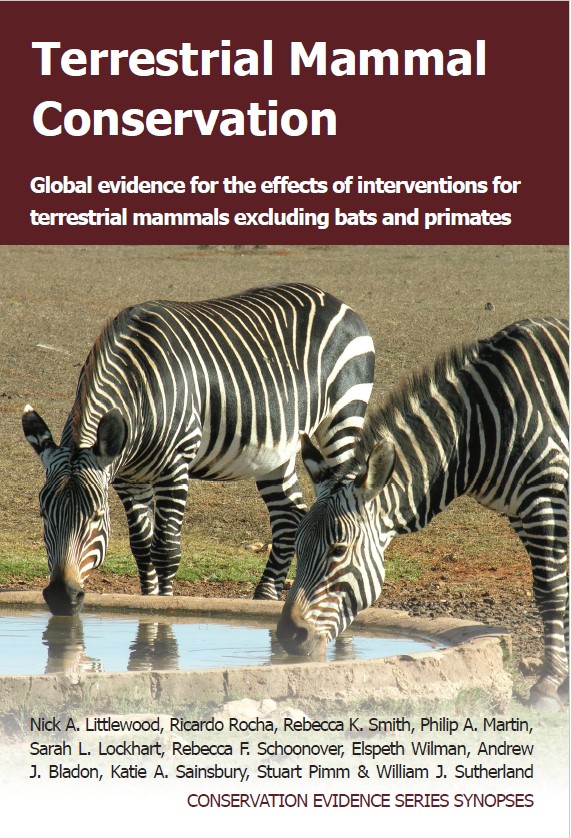Actions to conserve biodiversity
We have summarised evidence from the scientific literature about the effects of actions to conserve wildlife and ecosystems.
Review the evidence from the studies
Not sure what Actions are? Read a brief description.
Search for evidence
e.g. "frogs chytrid"
294 Actions found
Refine
Hide
294 Actions found
Download Actions
| 0 selected |
|
Order results by:
| Action | Effectiveness | Studies | Category | |
|---|---|---|---|---|
|
Use fencing to exclude grazers or other problematic species Action Link |
Likely to be beneficial | 3 |
|
|
|
Use electric fencing to deter mammals from energy installations or mines Action Link |
No evidence found (no assessment) | 0 |
|
|
|
Use drugs to treat parasites Action Link |
Likely to be beneficial | 7 |
|
|
|
Use drones to deter crop damage by mammals to reduce human-wildlife conflict Action Link |
Unknown effectiveness (limited evidence) | 1 |
|
|
|
Use dogs to guard crops to reduce human-wildlife conflict Action Link |
Unknown effectiveness (limited evidence) | 1 |
|
|
|
Use conditioned taste aversion to reduce human-wildlife conflict in non-residential sites Action Link |
Likely to be beneficial | 2 |
|
|
|
Use conditioned taste aversion to prevent non-target species from entering traps Action Link |
Likely to be beneficial | 1 |
|
|
|
Use collar-mounted devices to reduce predation by domestic animals Action Link |
Beneficial | 5 |
|
|
|
Use chili to deter crop damage by mammals to reduce human-wildlife conflict Action Link |
Likely to be beneficial | 7 |
|
|
|
Use chemical repellents along roads or railways Action Link |
Unlikely to be beneficial | 5 |
|
|
|
Use campaigns and public information to improve behaviour towards mammals and reduce threats Action Link |
Unknown effectiveness (limited evidence) | 2 |
|
|
|
Use bees to deter crop damage by mammals (e.g. elephants) to reduce human-wildlife conflict Action Link |
Likely to be beneficial | 3 |
|
|
|
Use artificial insemination Action Link |
Likely to be beneficial | 3 |
|
|
|
Use alternative de-icers on roads Action Link |
No evidence found (no assessment) | 0 |
|
|
|
Use ‘shock collars’ to deter crop damage by mammals to reduce human-wildlife conflict Action Link |
Unknown effectiveness (limited evidence) | 1 |
|
|
|
Treat mammals to reduce conflict caused by disease transmission to humans Action Link |
Unknown effectiveness (limited evidence) | 1 |
|
|
|
Treat disease in wild mammals Action Link |
Unknown effectiveness (limited evidence) | 3 |
|
|
|
Translocate to re-establish or boost populations in native range Action Link |
Beneficial | 64 |
|
|
|
Translocate problem mammals away from residential areas (e.g. habituated bears) to reduce human-wildlife conflict Action Link |
Likely to be ineffective or harmful | 11 |
|
|
|
Translocate predators for ecosystem restoration Action Link |
Likely to be beneficial | 2 |
|
|
|
Translocate predators away from livestock to reduce human-wildlife conflict Action Link |
Trade-off between benefit and harms | 11 |
|
|
|
Translocate mammals to reduce overpopulation Action Link |
Trade-off between benefit and harms | 3 |
|
|
|
Translocate mammals that have habituated to humans (e.g. bears) Action Link |
Trade-off between benefit and harms | 2 |
|
|
|
Translocate mammals away from sites of proposed energy developments Action Link |
Unknown effectiveness (limited evidence) | 2 |
|
|
|
Translocate mammals away from site contaminated by oil spill Action Link |
Unknown effectiveness (limited evidence) | 1 |
|
Download Actions
| 0 selected |
|

Terrestrial Mammal Conservation - Published 2020
Terrestrial Mammal Conservation
Watch this search
If you are familiar with RSS feeds, please click the button below to retrieve the feed URL:
RSS feed for this searchIf you are unfamiliar with RSS feeds, we would suggest reading this BBC article.
Unfortunately, due to the number of feeds we have available, we cannot provide e-mail updates. However, you could use tools such as Feed My Inbox to do this for you.
What are 'Individual studies' and 'Actions'?
Individual studies
An individual study is a summary of a specific scientific study, usually taken from a scientific journal, but also from other resources such as reports. It tells you the background context, the action(s) taken and their consequences.
If you want more detail please look at the original reference.
Actions
Each action page focuses on a particular action you could take to benefit wildlife or ecosystems.
It contains brief (150-200 word) descriptions of relevant studies (context, action(s) taken and their consequences) and one or more key messages.
Key messages show the extent and main conclusions of the available evidence. Using links within key messages, you can look at the paragraphs describing each study to get more detail. Each paragraph allows you to assess the quality of the evidence and how relevant it is to your situation.
Where we found no evidence, we have been unable to assess whether or not an intervention is effective or has any harmful impacts.





)_2023.JPG)














